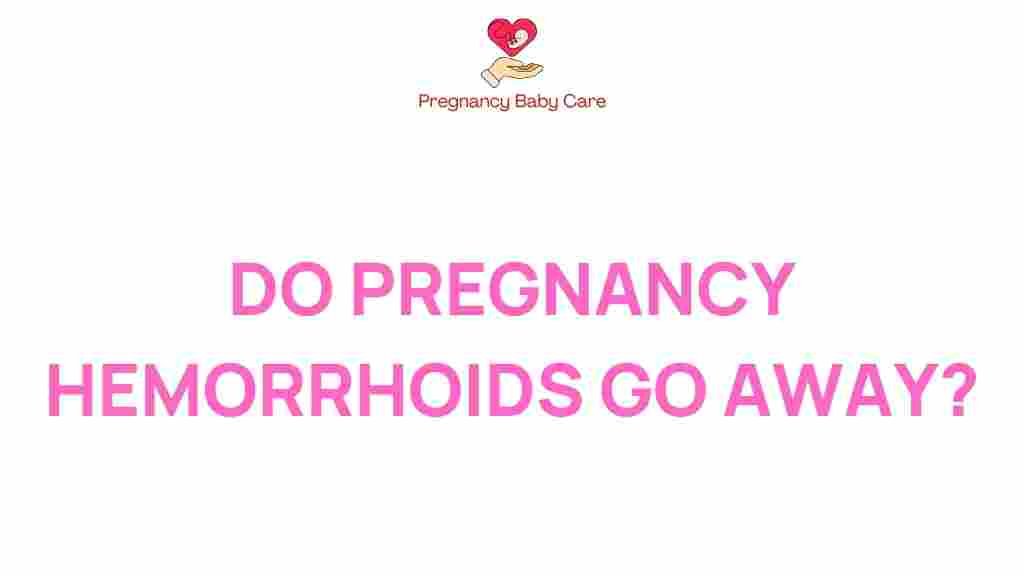Do Pregnancy Hemorrhoids Disappear? Understanding the Facts
Pregnancy is a beautiful journey, but it also comes with its share of challenges, one of which is the uncomfortable condition known as pregnancy hemorrhoids. These swollen veins in the rectal area can cause significant discomfort, leading many women to wonder if they will disappear after giving birth. In this article, we will unravel the myths and facts surrounding pregnancy hemorrhoids, including their symptoms, treatment options, prevention strategies, and postpartum care. We will also offer some valuable health tips to help manage discomfort and promote women’s health.
What Are Pregnancy Hemorrhoids?
Pregnancy hemorrhoids are essentially swollen veins located in the lower rectum or anus. They can be internal or external and are often caused by increased pressure in the pelvic area, hormonal changes, and constipation during pregnancy. Understanding the symptoms and causes can help in addressing this common issue effectively.
Symptoms of Pregnancy Hemorrhoids
The symptoms of pregnancy hemorrhoids can vary, but common signs include:
- Itching and irritation: The area around the anus may feel itchy or irritated.
- Pain or discomfort: Sitting, walking, or engaging in daily activities may become uncomfortable.
- Swelling: You may notice swelling around the anus.
- Bleeding: Bright red blood may appear on toilet paper or in the toilet bowl after bowel movements.
If you experience severe pain or excessive bleeding, it’s essential to consult a healthcare provider.
Causes of Pregnancy Hemorrhoids
Several factors contribute to the development of pregnancy hemorrhoids:
- Increased blood volume: The body produces more blood during pregnancy, which can lead to swollen veins.
- Hormonal changes: The hormone progesterone relaxes the walls of blood vessels, making them more prone to swelling.
- Pressure from the growing uterus: As the baby grows, it places additional pressure on the pelvic veins.
- Constipation: Many pregnant women experience constipation, which can exacerbate the problem.
Treatment for Pregnancy Hemorrhoids
While pregnancy hemorrhoids can be uncomfortable, there are several treatment options to help alleviate symptoms:
- Over-the-counter remedies: Creams and ointments specifically formulated for hemorrhoids can provide relief from itching and discomfort.
- Warm baths: Soaking in a warm bath can help soothe the area and reduce swelling.
- Cold compresses: Applying a cold compress can numb the area and relieve pain.
- Fiber supplements: Increasing fiber intake can help prevent constipation, which is critical in managing hemorrhoids.
It’s important to consult with a healthcare provider before starting any treatment, especially during pregnancy.
Prevention of Pregnancy Hemorrhoids
Preventing pregnancy hemorrhoids is often possible with a few lifestyle adjustments:
- Stay hydrated: Drinking plenty of water helps keep stools soft and reduces the risk of constipation.
- Eat a high-fiber diet: Incorporate fruits, vegetables, and whole grains into your meals to promote bowel regularity.
- Exercise regularly: Light exercise, such as walking, can improve circulation and help prevent constipation.
- Avoid prolonged sitting or standing: Take breaks to move around, especially if your job requires you to sit for long periods.
Postpartum Care for Hemorrhoids
After giving birth, many women wonder if their pregnancy hemorrhoids will disappear. In most cases, symptoms may improve significantly after delivery, but it is not uncommon for some women to continue experiencing discomfort. Here are some postpartum care tips:
- Continue a high-fiber diet: Maintaining a diet rich in fiber can help ensure regular bowel movements and prevent reoccurrence.
- Stay active: Gentle postpartum exercises can help improve circulation and promote healing.
- Consult with a healthcare provider: If hemorrhoids persist or worsen, it’s important to seek medical advice.
Health Tips for Managing Discomfort
Here are some additional health tips for managing discomfort from pregnancy hemorrhoids:
- Practice good hygiene: Keep the anal area clean and dry to prevent irritation.
- Use soft toilet paper: Opt for unscented and soft toilet paper to minimize irritation.
- Avoid straining: Straining during bowel movements can worsen hemorrhoids. Take your time and don’t rush.
- Consider pelvic floor exercises: Strengthening pelvic muscles can help improve circulation and reduce pressure on the veins.
Troubleshooting Common Issues
Despite your best efforts, you may still encounter challenges with pregnancy hemorrhoids. Here are some common issues and troubleshooting tips:
- Persistent bleeding: If you notice ongoing bleeding from hemorrhoids, consult your healthcare provider.
- Severe pain: If you experience severe pain, it could indicate a more serious condition, so seek medical attention.
- Development of blood clots: If a hemorrhoid becomes thrombosed (a blood clot forms), it can be very painful and may require medical intervention.
Understanding Myths About Pregnancy Hemorrhoids
Many myths surround pregnancy hemorrhoids. Here are a few clarified:
- Myth: Hemorrhoids only occur during pregnancy. Fact: While pregnancy increases the risk, hemorrhoids can occur at any time due to various factors.
- Myth: Surgery is the only treatment for hemorrhoids. Fact: Most cases can be managed with conservative treatments, and surgery is usually a last resort.
- Myth: Hemorrhoids will never go away. Fact: Many women find that their symptoms improve significantly after childbirth.
When to Seek Medical Help
If you experience any of the following symptoms, it’s crucial to consult a healthcare professional:
- Severe or persistent pain
- Excessive bleeding
- Signs of infection (such as fever or increased swelling)
- Symptoms that do not improve with home treatment
Conclusion
In conclusion, pregnancy hemorrhoids can cause significant discomfort, but understanding their symptoms, treatment options, and prevention strategies can help manage the condition effectively. While many women find relief after childbirth, some may continue to experience issues. By following the health tips and postpartum care strategies outlined in this article, you can promote healing and maintain good women’s health. Remember, it’s always wise to consult with a healthcare provider for personalized advice and treatment options.
For more information on women’s health, you can visit this resource.
Additionally, if you have questions or need support, consider reaching out to a community of women facing similar challenges. You’re not alone in this journey!
This article is in the category Health and created by PregnancyBabyCare Team
